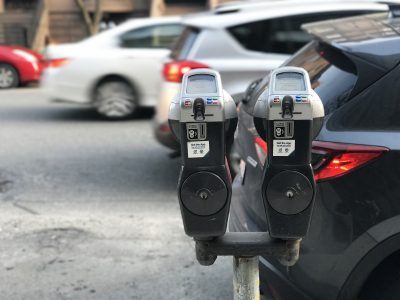
Boston Mayor Martin Walsh imposed parking meter changes in the Seaport District Monday, altering prices by 50 cents in an attempt to introduce flexible parking tolls in demanding metropolitan zones, according to a press release from Walsh’s office.
The city made the decision to adjust meter prices after observing sensor data outlining the average occupancy per meter space and block in any given city plot, according to the release.
The prices of approximately 550 metered parking spaces changed, the majority of which are decreasing from $1.50 to $1 an hour, according to the release.
Heavily trafficked blocks, defined on the official website for the parking pilot program as those with more than 80 percent of spots being used, will upsurge by 50 cents, while less engaged blocks, those with drivers using less than 60 percent of spots, will decrease by 50 cents.
Since the blocks have varying levels of congestion during different times of the day, parking space prices will vary depending on the time of day, according to the website. Prices will be displayed on the parking meters and range from a $1 minimum to a $4 maximum per hour.
Further rate adjustments will be made on the first Monday of June, August, October and December, according to the website.
Richard Dimino, the president and CEO of A Better City, a local organization that works with companies in the private and public sectors to improve the quality of life in Boston, said this price change will allow popular parking spots to be more proficiently managed.
“Overall, the City of Boston is moving towards an opportunity to price meter prices in the context of demand and market,” Dimino said. “Metered spaces are designed to provide short-term parking space opportunities. This really, at the end of the day, will allow what is very valuable curb space to be better managed and at the end, ultimately provide more parking spaces.”
Dimino said the city implemented a thoughtful and scientific method upon the decision to employ the change.
“Usually there is parking turnover studies that look at the relationship to the success of the program, and those types of approaches usually help to give transportation planners and city officials a sense of whether or not the pricing strategy is really working,” Dimino said. “I’m really pleased that [the] city is doing close monitoring and evaluating and making updates as they see fit.”
Barry Bluestone, a professor of public policy and urban affairs at Northeastern University, said he supports the change, including higher-priced meters, because the city produces more revenue as a result of the program’s implementation.
“The fact is that our on-street parking in Boston, until quite recently, was severely underpriced,” Bluestone said. “You could easily park on the street, and you could save an enormous amount of money, relative to private parking lots. Most of those private parking lots are gone in the Seaport District. They’re being eaten up by one building after another, but the city could certainly get more revenue.”
Bluestone said residents can typically afford meter prices, and the city should take advantage of this.
“I don’t mind buying the higher price because there is a limited amount of parking, and to the extent that the city can increase the amount of revenue it gets from the parking meters to improve the streets and improve the city, the better,” Bluestone said.
Bluestone said the price change is also beneficial because it has the potential to incentivize the use of public transportation.
“We need more incentives to get people to, when they can, take public transit and to find other ways of getting to where they’re going, if for no other reason than to reduce the traffic congestion,” Bluestone said.
Several Boston residents said the meter price change is a necessary improvement and is beneficial for tourists and locals alike in light of the fact that less popular spaces will be less expensive.
Mariah Hanlon, 20, of Brighton, said this price modification will better serve Boston drivers who struggle financially.
“I don’t drive a lot in Boston, but I know that for those who are strapped for money, expensive meter prices can’t help,” Hanlon said. “I agree with the city’s decision to lower some of these prices.”
Katrina Hall, 35, of Dorchester, said the initiative will be beneficial for residents in the long run.
“Though many of the prices are only being lowered by 50 cents, I think over time, that small amount of money can certainly add up,” Hall said.
Stephen Anderson, 39, of Brighton, said cheaper meter fees can be advantageous.
“I’m pretty happy about the change, especially for the meters that are becoming cheaper,” Anderson said. “Nobody likes meters, especially the cost that comes with them. Any minimization of prices can go a long way.”




